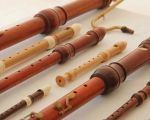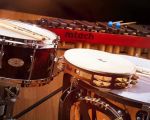The Journey of a Person Who Plays Multiple Musical Instruments
Music is a universal language, and for some, this language can be spoken fluently through not just one, but multiple instruments. A person who plays multiple musical instruments is often referred to as a multi-instrumentalist. These musicians have the unique ability to perform across various musical domains, whether that be through string, wind, or percussion instruments. But what does it mean to be a multi-instrumentalist? And how does playing multiple instruments shape a person’s musical identity? In this article, we’ll explore the benefits, challenges, and personal stories of those who embrace playing multiple instruments.
What It Means to Be a Multi-Instrumentalist
A multi-instrumentalist is a musician who plays more than one instrument proficiently. While some musicians might specialize in one instrument—be it piano, guitar, or drums—a multi-instrumentalist has a broader skill set and can perform across a variety of instruments. This versatility allows for greater musical expression, the ability to collaborate with different musicians, and an enhanced understanding of music theory.
Skills Required to Play Multiple Instruments
Becoming a multi-instrumentalist requires more than just basic knowledge of one instrument; it demands dedication, practice, and an understanding of the intricacies of each instrument. Many musicians start by learning one instrument and then branch out into others over time. For example, someone who is proficient on the guitar may pick up the bass or keyboard to enhance their musical versatility. Playing multiple instruments requires an understanding of various playing techniques, as well as the ability to adapt one’s approach to different musical styles and genres.
Musical Theory and Instrumental Knowledge
To truly excel as a multi-instrumentalist, a solid foundation in musical theory is crucial. This knowledge enables a person to understand how different instruments interact within a musical composition, how to arrange music for various instruments, and how to harmonize effectively. Additionally, the deeper a person’s knowledge of different instruments, the better they can blend sounds and create unique musical arrangements. A multi-instrumentalist is often able to experiment with different combinations of instruments, producing fresh and innovative music.
Benefits of Playing Multiple Instruments
There are numerous benefits to being a person who plays multiple musical instruments. Beyond simply mastering more than one instrument, a multi-instrumentalist gains a unique perspective on music and can enjoy a deeper, more comprehensive appreciation for the art. Below are some key advantages:
1. Enhanced Musical Creativity
When you’re comfortable playing different instruments, you gain a broader musical palette from which to draw inspiration. A multi-instrumentalist can experiment with different combinations of sounds, rhythms, and melodies, leading to more creative compositions. For example, someone who plays both guitar and piano can experiment with creating a song on one instrument and then layering the other to enhance the composition. This creative flexibility is often a hallmark of successful musicians who are known for their innovative sound.
2. A Better Understanding of Music Theory
Learning to play multiple instruments requires you to approach music theory from several perspectives. For instance, understanding how scales work on the guitar may differ slightly from how they function on the piano. As a result, multi-instrumentalists often have a deeper, more well-rounded understanding of how music works, making them more effective composers, arrangers, and performers. This expanded knowledge can also make learning new instruments easier over time.
3. Increased Performance Opportunities
Being proficient in multiple instruments opens up a wide range of performance opportunities. Multi-instrumentalists can take on diverse roles within bands, orchestras, or solo projects. For example, they may serve as the lead guitarist in one context but play bass or keyboards in another. This adaptability increases their chances of being sought after for musical collaborations, providing opportunities for more frequent gigs and performances.
4. Versatility in Collaboration
One of the most significant benefits of being a multi-instrumentalist is the ability to collaborate seamlessly with other musicians. Multi-instrumentalists can easily switch between instruments to complement other players in various musical genres. Whether it’s playing acoustic guitar during a folk song or adding a touch of synthesizer to a pop track, a multi-instrumentalist’s ability to adapt their skills makes them a valuable asset to any musical project.
Challenges of Being a Multi-Instrumentalist
While being a person who plays multiple musical instruments offers many benefits, it also comes with its challenges. Mastering several instruments requires significant time and dedication, and there are certain obstacles that multi-instrumentalists often face. Here are some of the challenges:
1. Time and Practice Demands
Learning and maintaining proficiency in multiple instruments takes time. Each instrument requires regular practice to stay sharp, and practicing different instruments can sometimes feel overwhelming. A multi-instrumentalist must balance their time effectively, ensuring they dedicate sufficient practice to each instrument without neglecting any of them. This time commitment can make it difficult to pursue other interests outside of music.
2. Depth vs. Breadth
One of the dilemmas that multi-instrumentalists often face is the trade-off between breadth and depth. While being skilled in multiple instruments is an advantage, it can sometimes limit the ability to master one instrument to the highest possible level. A person who splits their time between several instruments may struggle to reach the same level of technical proficiency as someone who focuses solely on one instrument. This can be a challenging decision for musicians who want to excel in a particular area while still being versatile.
3. Keeping Instrumental Skills Sharp
Maintaining proficiency across several instruments can be difficult. Some musicians find that they are able to play one instrument with ease but struggle to stay on top of their skills in others. This is especially true for instruments that require highly specialized techniques, such as brass or stringed instruments. For a multi-instrumentalist, the challenge is staying versatile while keeping each instrument sharp and ready for performance or recording.
Famous Multi-Instrumentalists: Inspiration for Aspiring Musicians
Many famous musicians have gained recognition not only for their ability to perform on one instrument but for their skills across a variety of instruments. Examples include Prince, who was known for playing everything from guitar and drums to keyboards, and Stevie Wonder, who is a virtuoso on instruments like the harmonica, piano, and drums. These musicians have demonstrated that being a multi-instrumentalist allows for greater creative freedom and musical expression.
Case Study: A Journey into Multi-Instrumentalism
Consider the case of Sarah, a budding multi-instrumentalist who began her musical journey with the piano but eventually expanded to the guitar and drums. At first, she struggled with finding enough time to practice each instrument, but over time, she developed a system that allowed her to dedicate a portion of her day to each instrument. With patience and practice, Sarah began to blend these instruments in her songwriting, creating unique soundscapes that she could not have achieved by focusing on one instrument alone. Her story highlights the challenges and rewards of pursuing multi-instrumentalism, illustrating how it can lead to greater creativity and opportunities in the music industry.
How to Become a Multi-Instrumentalist
If you're interested in becoming a person who plays multiple musical instruments, start by choosing an instrument you're passionate about. From there, expand gradually by learning another instrument that complements your primary one. Online tutorials, local music classes, and even working with a teacher can help guide your progress. Remember that becoming proficient takes time, so be patient with yourself and enjoy the process of musical growth.
For more resources and expert advice on becoming a skilled multi-instrumentalist, visit Beat Trigger for the best musical products and services tailored to your needs.








